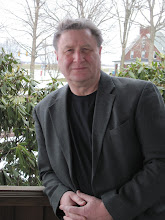ASTEROID CITY - a Review by Guy S. Malone, Researcher
"I want to know what the f**k Wes Anderson is on." -- Captain HE's first comment as the credits rolled after we saw Asteroid City, the newest addition to the wild, wild world of Wes Anderson.
With a cast second to none, it's evident that Wes is an actor's auteur. The question remains: is he a moviegoer's auteur? We used to think his films were an acquired taste, but we aren't so convinced anymore. The Czarina, for example, loves Fantastic Mr. Fox and thinks the rest of his films are "weird for weird's sake," and she has seen his most accessible films, Moonrise Kingdom and Grand Budapest Hotel. And I know two people who went to Wes's movies on the recommendation of friends and were so incensed afterward that they broadcast across social media that it was the worst drivel they had ever seen.
Our conclusion: you either like Wes Anderson films or you don't. If you like his movies (we do) your affection from film to film is a matter of degree. If you don't like his films, the matter of degree ranges from thinking he's "just weird" to a hatred that burns like a thousand suns. For the record, Captain HE liked Asteroid City, calling it "a masterful understatement of 50's America. A nation concentrating on the wonders of terrestrial science while living placidly with the destructive power of atomic fission."
Wes takes us back to 1955 in the titular small southwestern town with a grand painted desert vista. The camera does a 360-degree pan, revealing a more colorful version of the town in Bad Day at Black Rock, except for an on-ramp to nowhere (of course.) But the town is deserted--our cue that this is a set. And here is where a newbie to a Wes Anderson film either buys in or cashes out. Our film goes black-and-white and the aspect ratio becomes that of an old Sylvania TV set. We become witnesses to a 1950s-era teleplay-in-the-making, as explained by a Rod Serling/Edward R. Murrow-type host (Bryan Cranston). He introduces us to a stuffy playwright (Edward Norton) and an angsty director (Adrien Brody). The idea of showcasing a play-within-a-TV-show-within-a-movie is difficult to describe, but those three set the stage, as it were.
This is the transition that takes us back to the colorized movie set, where Midge Campbell (Scarlett Johansson), a Marilyn Monroe-esque celebrity arrives with her daughter Dinah (Grace Edwards), an award winner in Asteroid City's Annual Junior Stargazers and Space Cadets convention. Augie Steenbeck (Jason Schwartzman), a recently widowed war photographer, shows up with his daughters, who think they are witches (Ella, Gracie, and Willan Faris), and his teenage son, Woodrow (Jake Ryan), another award-winner. Augie's children have recently lost their mother, but Augie has not found the right time to tell them. His wife's ashes are in a Tupperware container, which Augie intends to present to his cranky and disapproving father-in-law Stanley (Tom Hanks) when he arrives. Woodrow falls for Dinah, which brings the laconic Augie and the aloof Midge together. They share their tales of woe and ennui through the windows of their side-by-side cabins in a rental park. Their confessions evolve into a kind of seduction. But it's difficult for romance to blossom when cars zip through the streets shooting at each other for no apparent reason, mushroom clouds from atomic bomb tests blossom on the horizon, and a close encounter of the second kind brings chaos and a military quarantine to Asteroid City.
Just when we're becoming accustomed to what is happening in the colorful movie, we're returned to the black-and-white world behind the scenes.
As usual, a lot is going on--too much, really to take in with one viewing, and the detail and minutiae are big parts of what makes Wes Anderson movies special. They are the baubles that decorate the plot and provide the backdrop for the wide array of characters, many, little more than cameos. In addition to Johansson, Schwartzman, Norton, and Brody, many other Anderson regulars show up: Jeffrey Wright as an Army General, Tilda Swinton as an astronomer, along with Willem Dafoe, Tony Revolori, Liev Schreiber, and Jeff Goldblum as the Alien (of course). We also welcome newcomers to WesWorld: Tom Hanks, as mentioned; Hope Davis and Stephen Park as parents; Rupert Friend as a cowboy smitten with science teacher Maya Hawke; Steve Carell as the happy-go-lucky motel manager; Matt Dillon as an auto mechanic; Margot Robbie, in a walk-on, and many others.
Cinematographer Robert Yeoman perfectly visualizes Anderson's co-writer Roman Coppola's screenplay, as does Adam Stockhausen through his delightfully detailed production design. They frame both the order and the chaos of the film, with its inspired toggling back and forth between the paranoid 1950s-era Grade-B Sci-Fi flicks and the gravitas of anthology TV series, like the much-feted Playhouse 90. Even as we write this review and reflect, the inventiveness and soul of Asteroid City grow in our estimation.
A second viewing will likely push the score higher, but for now: 8.0 out of 10







